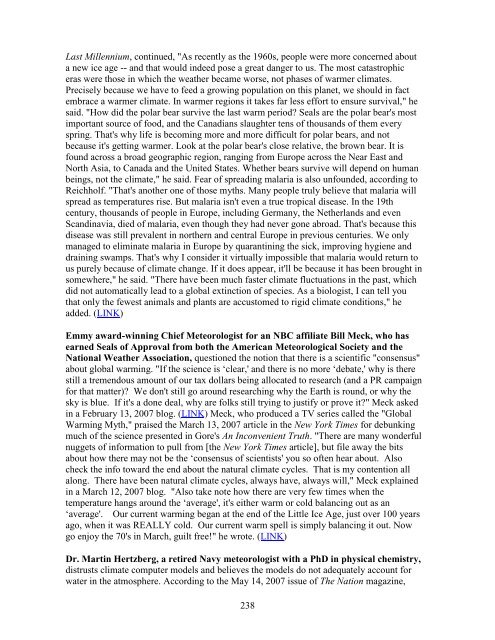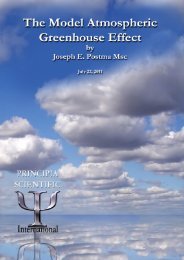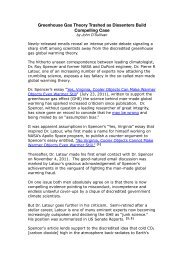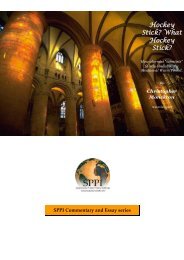Than 1000 International Scientists Dissent Over Man-Made Global ...
Than 1000 International Scientists Dissent Over Man-Made Global ...
Than 1000 International Scientists Dissent Over Man-Made Global ...
Create successful ePaper yourself
Turn your PDF publications into a flip-book with our unique Google optimized e-Paper software.
Last Millennium, continued, "As recently as the 1960s, people were more concerned about<br />
a new ice age -- and that would indeed pose a great danger to us. The most catastrophic<br />
eras were those in which the weather became worse, not phases of warmer climates.<br />
Precisely because we have to feed a growing population on this planet, we should in fact<br />
embrace a warmer climate. In warmer regions it takes far less effort to ensure survival," he<br />
said. "How did the polar bear survive the last warm period? Seals are the polar bear's most<br />
important source of food, and the Canadians slaughter tens of thousands of them every<br />
spring. That's why life is becoming more and more difficult for polar bears, and not<br />
because it's getting warmer. Look at the polar bear's close relative, the brown bear. It is<br />
found across a broad geographic region, ranging from Europe across the Near East and<br />
North Asia, to Canada and the United States. Whether bears survive will depend on human<br />
beings, not the climate," he said. Fear of spreading malaria is also unfounded, according to<br />
Reichholf. "That's another one of those myths. <strong>Man</strong>y people truly believe that malaria will<br />
spread as temperatures rise. But malaria isn't even a true tropical disease. In the 19th<br />
century, thousands of people in Europe, including Germany, the Netherlands and even<br />
Scandinavia, died of malaria, even though they had never gone abroad. That's because this<br />
disease was still prevalent in northern and central Europe in previous centuries. We only<br />
managed to eliminate malaria in Europe by quarantining the sick, improving hygiene and<br />
draining swamps. That's why I consider it virtually impossible that malaria would return to<br />
us purely because of climate change. If it does appear, it'll be because it has been brought in<br />
somewhere," he said. "There have been much faster climate fluctuations in the past, which<br />
did not automatically lead to a global extinction of species. As a biologist, I can tell you<br />
that only the fewest animals and plants are accustomed to rigid climate conditions," he<br />
added. (LINK)<br />
Emmy award-winning Chief Meteorologist for an NBC affiliate Bill Meck, who has<br />
earned Seals of Approval from both the American Meteorological Society and the<br />
National Weather Association, questioned the notion that there is a scientific "consensus"<br />
about global warming. "If the science is ‗clear,' and there is no more ‗debate,' why is there<br />
still a tremendous amount of our tax dollars being allocated to research (and a PR campaign<br />
for that matter)? We don't still go around researching why the Earth is round, or why the<br />
sky is blue. If it's a done deal, why are folks still trying to justify or prove it?" Meck asked<br />
in a February 13, 2007 blog. (LINK) Meck, who produced a TV series called the "<strong>Global</strong><br />
Warming Myth," praised the March 13, 2007 article in the New York Times for debunking<br />
much of the science presented in Gore's An Inconvenient Truth. "There are many wonderful<br />
nuggets of information to pull from [the New York Times article], but file away the bits<br />
about how there may not be the ‗consensus of scientists' you so often hear about. Also<br />
check the info toward the end about the natural climate cycles. That is my contention all<br />
along. There have been natural climate cycles, always have, always will," Meck explained<br />
in a March 12, 2007 blog. "Also take note how there are very few times when the<br />
temperature hangs around the ‗average', it's either warm or cold balancing out as an<br />
‗average'. Our current warming began at the end of the Little Ice Age, just over 100 years<br />
ago, when it was REALLY cold. Our current warm spell is simply balancing it out. Now<br />
go enjoy the 70's in March, guilt free!" he wrote. (LINK)<br />
Dr. Martin Hertzberg, a retired Navy meteorologist with a PhD in physical chemistry,<br />
distrusts climate computer models and believes the models do not adequately account for<br />
water in the atmosphere. According to the May 14, 2007 issue of The Nation magazine,<br />
238





